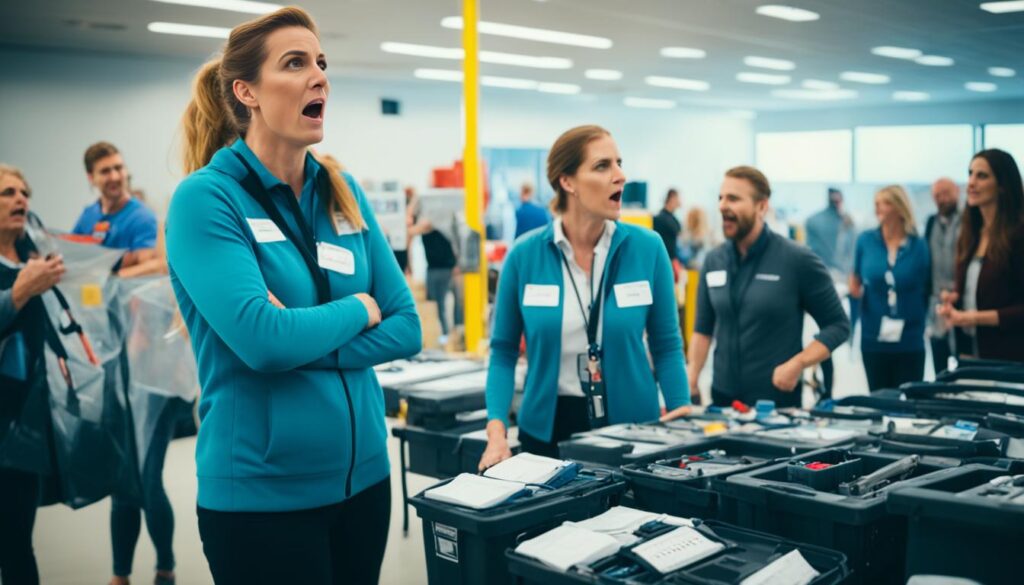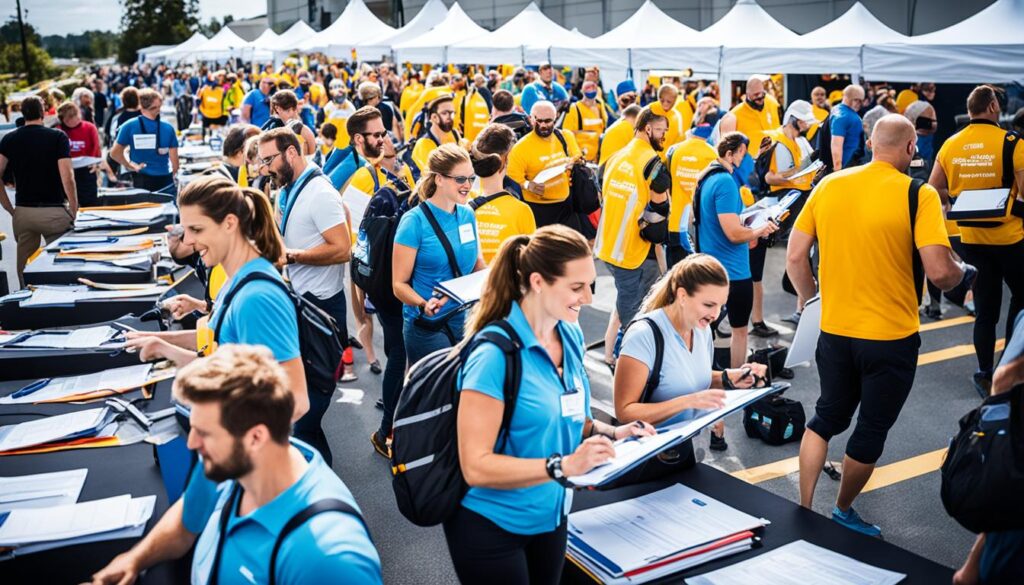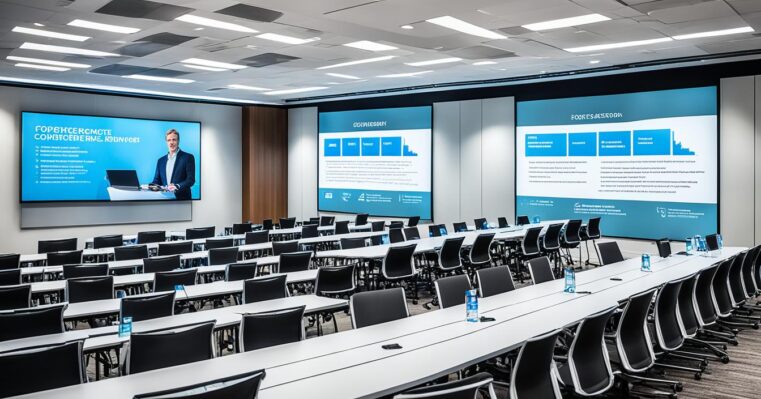Are you new to corporate event planning? It can seem overwhelming, but with the right steps, you can make it work. This guide will give you the key tips to plan a successful event. You'll learn how to set a budget, pick the best venue, and more.
Key Takeaways
- Understand the importance of setting clear goals and objectives for your corporate event.
- Learn how to effectively manage your budget and leverage event management software for increased efficiency.
- Discover the best practices for selecting the perfect venue and catering options to delight your attendees.
- Explore innovative ways to promote your event and engage your audience, both in-person and virtually.
- Gain insight into the benefits of hiring a professional event planner to ensure a seamless execution.
What is Corporate Event Planning?
Corporate event planning is all about planning different events to meet business goals1. These events can be anything from company meetings to team-building trips. The size and type of event affect how much planning is needed. This includes everything from organizing the main event to booking travel and setting up the agenda1.
Understanding the Concept of Corporate Events
Corporate events help share company goals, change how employees work, or launch new products1. They also motivate staff, support marketing, reward teams, or entertain top leaders1. Planning these events is more than just about scheduling meetings. It includes planning corporate parties, client events, and more.
Common Types of Corporate Events
There are many kinds of corporate events, such as:
- Conferences and trade shows
- Shareholder meetings and exhibitions
- Product launches and client entertainment
- Team-building workshops and retreats
- Experiential events and company celebrations
Events can be small, with up to 100 people, or huge, with thousands of guests1.
"Corporate events are a powerful tool for businesses to achieve their strategic objectives, from internal engagement to external brand promotion."
Planning and executing corporate events well is key to their success2. With the right strategy, companies can boost their brand, improve employee morale, and grow their business2.
Challenges of Planning a Corporate Event
Planning a corporate event is a big task. It takes months and involves many steps. Event planners face challenges like meeting the budget, creating engaging content, keeping attendees interested, and handling logistics2.
It's important to tackle these issues early to avoid surprises and ensure a great experience for everyone. Companies use social media, emails, and ads to promote events. They need six months to plan well3.
Big events like Microsoft's Ignite and Apple's WWDC draw thousands of people. They need careful planning, great speakers, and smart marketing3. Experts at Alcor Prime and Goodworks help by understanding what clients need and managing the event's details2.
| Challenge | Description |
|---|---|
| Event Budget | Staying within the allocated budget while providing a high-quality event experience. |
| Meaningful Content | Creating engaging and valuable content that resonates with the target audience. |
| Attendee Retention | Keeping attendees interested and enthusiastic throughout the entire event. |
| Strict Timelines | Ensuring all event activities and logistics adhere to a tight schedule. |
| Technological Issues | Addressing any technical problems that may arise during the event. |
| Logistics Management | Coordinating and overseeing all the moving parts of the event logistics. |

"Successful corporate event planning requires a keen eye for detail, adaptability, and a deep understanding of your audience. Navigating the challenges is part of the journey, but with the right team and strategies, you can create an unforgettable experience."
By tackling these challenges early and using expert planners, companies can host events that engage attendees, stay on budget, and meet their goals2.
The Five C's of Corporate Event Planning
Corporate event planning experts focus on the five C's: Concept, Coordination, Control, Culmination, and Closeout4. These elements help guide a successful event.
Concept and Coordination
Starting with Concept and Coordination sets the event's base. It means defining who the event is for, its purpose, and what it aims to achieve4. Then, coordinating details like date, time, and place sets the stage for planning.
Control and Culmination
Control and Culmination manage the event flow and support staff on event day. They handle logistics, assign tasks, work with vendors, and have a solid communication plan4. Using a mobile event app for real-time performance checks helps make key decisions4.
The Culmination marks the event's peak, where all planning culminates into a memorable experience for guests4. It's key for hitting event goals and making a strong impact.
Closeout reviews the event's success, checks the budget, and gathers feedback for future planning4. This step measures the event's impact and learns lessons for future events.
Remembering the five C's helps event planners tackle the complex task of organizing events. They deliver top-notch experiences that meet their clients' goals4.
| Event Size | Number of Delegates | Example Events |
|---|---|---|
| Micro Events | Up to 100 | Meetings, Intimate Training Sessions |
| Small Events | 100 to 250 | Seminars, Departmental Conferences |
| Midsize Events | Up to 1,000 | Conferences, Summits |
| Large-scale Events | Thousands | Multi-day Activities, Enterprise Tools |
Knowing about event sizes helps planners plan and execute events that meet client needs and expectations5.
"The ultimate aim of a budget meeting is to chart the company's financial path through careful analysis, informed discussion, and collaborative decision-making."
Essential Tips for Concept and Coordination
Planning a successful corporate event takes a lot of work and careful planning. Here are some key tips to make sure your event's concept and coordination are spot on.
Set Specific, Measurable Goals and Objectives
Start by setting clear, SMART (Specific, Measurable, Achievable, Relevant, and Time-bound) goals and objectives for your event. These goals should match your company's big-picture plans to make sure the event is a hit2. Having these objectives will steer the planning, from promoting the event to checking its effects.
Confirm Your Event Budget
It's vital to confirm and plan your event budget. Do deep research on all costs, like venues, sponsors, speakers, and event management tools, to make smart budget choices2. Start planning early and focus on what's most important to the event's theme and goals to keep within budget.
Research Your Target Audience
Understanding who your target audience is key to making an event they'll love and get into. Look at past attendees, check out your competitors, create profiles of your ideal guests, and send out surveys to learn what they want and like2.
Choose the Perfect Venue
Picking the right venue is crucial for a corporate event. Think about the event's location, the venue's size and how many people it can hold, what amenities and services it offers, and how easy it is for everyone to get there2. The venue should match your event's goals and budget for it to be a success.
By following these key tips for planning and coordination, you'll set your corporate event up for success right from the start.

"Effective event coordination can boost efficiency by about 25% compared to old paper methods."6
Event Promotion and Marketing
Promoting a corporate event is key to getting people excited and interested. Event planners should use social media, event websites, and ads to reach out to people3. Offering discounts and working with influencers can also boost sign-ups and attendance3.
Creating a great event website is a must5. It should look good and share important details. Using social media to talk to the audience is also important5. Plus, making marketing materials like teaser emails and posters can help a lot5. Starting to promote early helps build excitement and makes sure more people know about the event3.
Offering special deals or unique experiences can make people want to come3. Working with influencers can spread the word and draw in more people5.
A strong plan for promoting and marketing an event is crucial for success3. By using both online and offline marketing, event planners can make sure their message gets across to the right people5.
Managing Logistics and Facilitating Production
Getting the event logistics right is key in planning a corporate event. It's important to assign the right team members to certain tasks. Make sure to work closely with vendors on what to expect. Also, take venue tours with your team, use clear signage, and plan your communications well. This ensures everything goes smoothly7.
Handle Logistics Efficiently
Corporate events can be big or small, from micro events for a few dozen people to huge ones with tens of thousands of guests5. They can cost anywhere from $10,000 to $100,000. It's best to start planning six months early to get everything ready7.
Choosing the right venue is a big deal. You'll send out Requests for Proposals (RFPs) to a few places, looking at what people say, what you need, and your budget5.
Measure Real-Time Performance
Using a mobile event app helps event organizers get real-time data. This lets them make quick decisions to improve the event. Making choices based on data-driven decision making is key to a successful event7.
| Event Type | Approximate Attendee Count |
|---|---|
| Micro Event | Up to 100 delegates |
| Small Event | 100-250 delegates |
| Midsize Event | Up to 1,000 delegates |
| Large-scale Event | Up to 10,000 attendees |

"Efficient event logistics management is the backbone of a successful corporate event. By aligning team assignments, vendor partnerships, and real-time performance tracking, event planners can deliver a seamless and memorable experience for all attendees."
Post-Event Wrap-Up and Follow-Up
After the excitement of a corporate event, it's key to look into the post-event evaluation. This is when we check the budget, get feedback, and see how successful the event was. By looking at these things, event planners can learn a lot to help plan better for the future.
Evaluate the Budget
Doing a deep dive into the post-event budget evaluation is vital. Event planners need to carefully track all expenses and see how they match up with the budget. This helps spot where costs were too high or too low1. This info is gold for better expense tracking and ROI assessment for future events.
Gather Feedback and Evaluate Success
Getting post-event feedback from people who came, the people who helped out, and the staff is key. Event planners should ask about the event's content, the place it was held, the food, and how happy everyone was1. This feedback helps figure out if the event hit its marks and what can be better next time.
By doing a deep success evaluation and always looking to get better, event planners can make sure each event is more powerful and meets the company's goals1.
"Evaluating the success of a corporate event is not just about the numbers – it's about understanding the overall impact and how we can make our events even better in the future."
corporate event planning tips for beginners, goodworks, alcorprime
Starting your journey in corporate event planning? It's key to have the right tips and insights for success. This article offers a detailed guide to help you through the industry's challenges1.
One important tip is to plan early. Experts suggest starting 6-9 months before your event for the best results1. This gives you time to find the perfect venue and work with vendors. Using event management software can also save you 5-10 hours a week1.
Knowing your audience is crucial. Research their likes and needs to make your event appealing to them. This can boost engagement by 40% through smart social media and email marketing1.
Adding the right technology can improve your event by 20%1. From interactive displays to live streaming, the latest tech can make your event better and more engaging.
Companies like Goodworks and Alcorprime are leaders in corporate event planning. They're experts in planning various events, from conferences to festivals8. Their focus on smooth event management and the latest tech makes them trusted by businesses everywhere.
By using these corporate event planning tips for beginners, you can plan successful events. Drawing from leaders like Goodworks and Alcorprime, you'll meet your audience's needs and boost your brand1.

Deciding Whether to Hire a Professional Event Planner
When planning a corporate event, deciding whether to hire a pro can be tough. This article offers tips for beginners, but sometimes, an expert is the best choice. Event planners bring a wealth of experience and expertise that can help ensure your event's success and reduce your stress levels.9
One big plus of hiring a pro is their deep knowledge of the industry. They have years of experience planning all sorts of corporate events and can offer valuable insights to help you meet your goals.9 They also have a big network of vendors and resources, making your event run smoothly. Looking at a company's portfolio and reviews can give you a sense of their style and success rate.9
Planning an event in-house might seem cheaper at first, but it can get expensive. Companies might save money in the long run by hiring pros, even if it costs more upfront.9 Plus, hiring a pro gives companies and employees more time to focus on important tasks.9
When picking an event planner, make sure they specialize in your event type. They might charge a flat fee or a percentage of your budget. It's smart to hire them 6-12 months before your event, especially for big ones.9 Having a clear budget and good communication is key when working with a pro.
Deciding to hire a pro depends on your event's size, complexity, and importance. Even though it costs more, their expertise, network, and management skills can make your event successful and stress-free.9
| Benefit | Metric |
|---|---|
| Increased Engagement | 40% increase in engagement through social media and email marketing1 |
| Higher Attendance Rates | 65% higher attendance rates for virtual events compared to in-person events1 |
| Time Savings | 5-10 hours per week saved through event management software1 |
| Improved Effectiveness | 20% increase in event effectiveness through technology integration1 |
| Increased Satisfaction | 15-20% higher attendee satisfaction through focused coordination1 |
| Enhanced Brand Perception | 10-15% boost in brand perception through sustainable practices1 |
"Good event management is crucial for event success."1
Think about these points and the benefits to decide if hiring a pro is right for your event91.
Conclusion
Planning a successful corporate event planning tips means knowing the whole process from start to finish. This article has given you tips and event planning best practices to help you. These can make your events better for everyone involved. No matter if you're new or have done it before, tips from experts like Goodworks and Alcorprime can guide you1.
Getting your planning right and paying attention to details is key for a great corporate event. Starting to plan 6-9 months early and using event management software can make things run smoother and save time1. Also, choosing the right venue is crucial, as 85% of successful events say it's a big reason for their success. Adding eco-friendly touches can also make your event more appealing and boost your brand by 10-15%1.
Knowing the value of corporate event planning tips, event planning best practices, and event management success helps planners make events that people remember. With help from leaders like Goodworks and Alcorprime, you can plan events that help your business grow and make your brand stronger2.
FAQ
What is the concept of corporate events?
Corporate events aim to share company strategies, change how employees act, launch new products, motivate staff, train them, or reward their hard work. They also help shape how customers see the brand. These events bring employees together, support marketing, reward teams, or entertain top leaders.
What are the common types of corporate events?
Corporate events include company conferences, training seminars, team outings, and client meet-ups. They're divided into micro events for up to 100 people, small events for 100-250, midsize for up to 1,000, and large events for up to 10,000 people.
What are the key challenges of planning a corporate event?
Planning a corporate event comes with big challenges. These include sticking to the budget, creating engaging content, keeping attendees interested, meeting tight deadlines, dealing with tech issues, and managing logistics.
What are the five C's of corporate event planning?
The five C's are Concept, Coordination, Control, Culmination, and Closeout. Concept and Coordination guide the planning. Control and Culmination manage the event flow and support staff. Closeout wraps up the event.
How can event planners set goals and objectives for a corporate event?
Setting event objectives should be SMART: Specific, Measurable, Achievable, Relevant, and Time-bound. This makes them realistic and trackable. It helps guide the planning, from promotion to evaluation.
How can event planners confirm the event budget?
Planners should list all costs, like venue, sponsors, speakers, and management tools. Planning early and prioritizing tasks helps stay within budget.
How can event planners research their target audience?
They can look at past attendees, study competitors, create personas, and send surveys. This helps understand what their audience likes and needs.
What factors should event planners consider when selecting a venue?
Consider the event's location, venue size, amenities, and accessibility. Choosing the right venue is key to the event's success.
How can event planners promote and market the corporate event?
Use social media, event websites, and ads to reach attendees. Offering discounts and working with influencers can boost registration.
How can event planners efficiently manage the event logistics?
Assign tasks to the right team members, work with vendors, conduct venue tours, use good signage, and have a solid communication plan. This ensures a smooth event.
How can event planners measure real-time performance during the event?
Use a mobile event app for real-time data and insights. This helps make quick decisions to improve the event and solve problems.
How can event planners evaluate the success of the corporate event?
Check the budget and ROI after the event. Collect feedback from attendees, vendors, and staff to see if goals were met and what can be improved.
When should event planners consider hiring a professional event planner?
If planning feels too much, consider hiring a pro. They have the skills and knowledge to manage the event well and help achieve its goals.
Source Links
- How to Plan Corporate Events with Alcor Prime & GoodWorks - https://alcorprime.com/how-to-plan-corporate-events-alcor-prime-goodworks/
- Corporate Events Planning with Alcor Prime & Goodworks - https://alcorprime.com/corporate-events-planning-alcor-prime-goodworks-2/
- Corporate Event Management The Ultimate Guide - https://alcorprime.com/corporate-event-management/
- What is Budget Meeting? Guide to Company Budget Meeting - https://alcorprime.com/budget-meeting/
- A Must-Know Guide To Corporate Event Planning - https://www.cvent.com/en/blog/events/guide-corporate-event-planning
- Organize Corporate Events with Alcor Prime & GoodWorks - https://alcorprime.com/how-to-organize-corporate-events-alcor-prime-goodworks/
- Corporate Events Planning with Alcor Prime & GoodWorks - https://alcorprime.com/corporate-events-planning-alcor-prime-goodworks/
- Home - https://goodworks.co.id/
- The Impact of Company Event Planners Elevating Your - https://alcorprime.com/company-event-planners/






